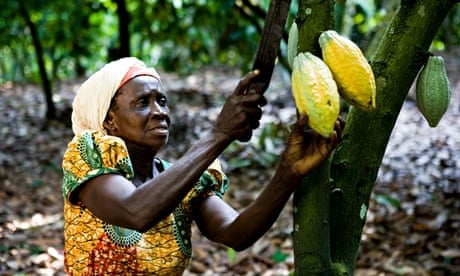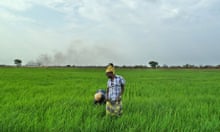Civil society groups have criticised the US government’s enthusiasm for private sector investment in Africa, as the head of the country’s development agency announced a controversial agriculture scheme had now attracted more than $10bn (£5.9bn).
On Tuesday, at the US-Africa summit in Washington, the US aid agency, USAid, lauded the increased company investment in the New Alliance for Food Security and Nutrition initiative, launched by Barack Obama at the G8 summit in 2012 to accelerate agricultural production and improve the lives of 50 million people in Africa by 2022.
The initiative has been condemned as a new wave of colonialism for its requirement that governments change laws and policies in favour of businesses. Critics have also expressed alarm at the lack of effective monitoring and accountability mechanisms.
US officials claim the total investment will now create about 650,000 jobs and benefit more than 5 million smallholder farmers in the 10 African countries that have signed up to the New Alliance – Benin, Burkina Faso, Ethiopia, Ghana, Ivory Coast, Malawi, Mozambique, Nigeria, Senegal and Tanzania.
More than 220 companies are involved in the initiative, including Coca-Cola, which this week announced plans to launch a scheme to source more ingredients for its products locally, in partnership with the New Alliance.
USAid administrator Rajiv Shah said: “Africa is on the rise. Under the leadership of President Obama, we have pioneered a new model of development that is transforming agriculture and accelerating Africa’s impressive growth and potential. By harnessing the skills, resources and expertise of the private sector, we can build on our investments to power the markets of the future and lift millions of people out of extreme poverty.”
However, Katie Campbell, a senior policy analyst at ActionAid US, said Obama’s policies had “missed the mark”.
She added: “Handing over the future of farming in Africa to big agribusinesses will only hurt people living with poverty and hunger. Poor farmers need investment from US and African governments to help their farms flourish. Companies should be part of Africa’s agricultural future, but profit must not be prioritised over people’s rights.”
The NGO’s African advocacy officer, Buba Khan, said: “Western companies are already taking land that’s being used to produce food from African farmers, pushing them further into poverty. Under the New Alliance, this will only get worse.
“The US and African governments must invest in the farmers producing food for the continent, not big businesses growing crops for export. The New Alliance will put more money into the pockets of a few wealthy businessmen who are clearly not concerned with the food security of Africa’s most vulnerable people.”
Director of the World Development Movement, Nick Dearden, said: “That the New Alliance is all about corporate profit is laid bare by the absence of any effort to monitor its impact on poverty and hunger. Aid money should be withdrawn from this scheme and used instead to strengthen small, independent African farmers in producing food for local people.”
The latest progress report on the New Alliance showed that only 65 companies had provided feedback on the impact of their investments under the scheme. Companies are not bound to report back on progress and when they do it’s through a process of self-reporting.
The report said that almost 37,000 jobs have been created through the scheme so far, reaching 3 million smallholder farmers, although details of the kinds of jobs or how they were reached were not given. Around 95% of the policy changes have been advanced or completed, and funding of around $2.1bn has so far been disbursed from donors, which include the US, UK and EU, it said.
However, only 21% of the 3 million farmers reached through the scheme are women, who have filled 40% of the newly created jobs. A key tenant of the New Alliance is to provide greater support to women, who comprise more than half the continent’s farmers.
The report acknowledged that much more progress was needed to improve these statistics. It said greater attention was required to ensure investors and governments adhere to voluntary guidelines to protect land rights.





